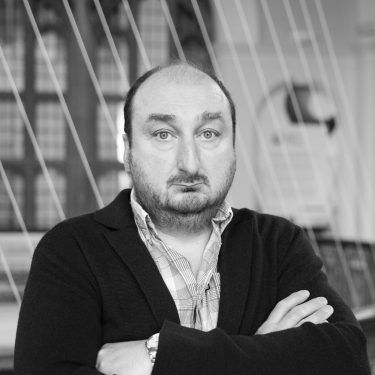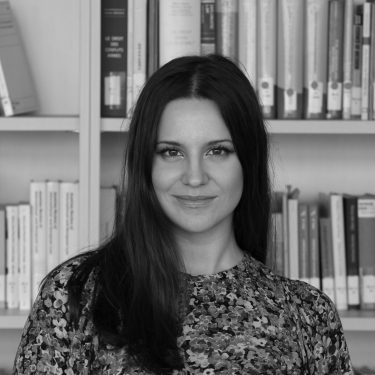Chatting with Alexander Orakhelashvili
Welcome to the latest interview of the Völkerrechtsblog’s symposium ‘The Person behind the Academic’! With us we have Professor Alexander Orakhelashvili, and through the following questions, we will try to get a glimpse of his interests, sources of inspiration and habits.
Welcome Professor Orakhelashvili and thank you very much for accepting our invitation!
You are most welcome!
May I first ask, as I usually do, what it was that brought you to academia and what made you stay?
It was something that I inherited from my family tradition. My parents have been active in medical research for several decades. Inside our family too, education, knowledge and expertise were valued more than money and profit. I was interested in various disciplines from school age onwards, and when I became a law student, I found international law scholarship to be fascinating and was keen to spend all my life in it. However, that was in Georgia in the 1990s where the rise of liberal market economy led to academics losing the position and respect that they had enjoyed beforehand. To say that libraries and universities were under-resourced would be a strong compliment. If I had gone into academia then, I would have to work effectively without a salary. So, I went on to work for civil service, first for parliament, then for the Ministry of Foreign Affairs, but continued to seek opportunities for further education. After a couple of years of scholarship hunt, the Dutch Government offered me a full scholarship to do an LLM at Leiden University, whereupon my employer gave me a choice: either Leiden University, or the Ministry of Foreign Affairs. The choice was rather easy to make. After my LLM, I went on to do PhD at Cambridge, and since then never looked anywhere past the academia. As for what made me stay, the main factor has always been the academic freedom.
If you were not an academic, what would you be?
A gardener, perhaps? But this is a purely hypothetical guess, though one that incidentally shows I have never been interested in anything outside academia.
Reading your publications, one could assume that you enjoy working on theoretical/doctrinal questions (the interpretation of acts and rules of international law, causation, or jus cogens’ modification among many others). Do you find more practice-oriented research topics boring? Which is an international law topic that you find extremely boring?
I wouldn’t say the above issues are exclusively theoretical. The issue of interpretation is an essential part of the daily operation of the international legal system; and so are State immunity, use of force, the operation of the Security Council and other issues that I have dealt with over past decades. I don’t think any international law topic could be described as boring. I have at times heard from academics with critical orientation that certain areas of international law are boring, for instance State responsibility. As it happens, these “boring” topics are at the core of the system. If you want to be an international lawyer, you must be prepared to work with that concrete system of international law that operates within the given time and space. If you want me to set a quick test on whether international law is one’s calling, I would suggest reading these two judgments from the International Court of Justice: one on continental shelf delimitation between Tunisia and Libya, and the other one on Gabčíkovo-Nagymaros. I would suggest that anyone willing to do international law reads both these judgments and if they find that one or both of them are uninteresting and boring, then a different area of activities would be far more rewarding to them.
Which of your publications is your favourite one? And which of them is your least favourite?
I always find it difficult to answer this question. The short answer to both parts of this question is neither. All my work involves the same effort and expertise, even if various publications differ in format and type.
Could you share with us three books/authors that have had a major impact on your perception of justice?
If you mean justice in general, then the New Testament. If you mean justice for the purposes of international law, then see my answer to the next question.
Which are three texts that you would wish all academics working on international law would read?
Vattel’s Law of Nations; Hersch Lauterpacht’s Function of Law in the International Community; Gerald Fitzmaurice’s Law and Procedure of the International Court of Justice.
Would you say that religion has had an impact on your perception of justice?
Again, very much so if it is about justice in general. But not that much if you mean international law as a secular legal system. I also think that one should not allow one’s own political and ideological convictions (whether liberal, republican, utilitarian, nationalist or any description, or other) to influence one’s sense of international justice in the sense of second-guessing the outcomes and solutions that follow from the operation of the concrete system of positive international law that operates within the given time and space. It would be rather easy to see through and, in the end, it would be counter-productive.
What is your favourite place to read and write? What is always near you when you read and write?
My house and my office. Tea kettle has always to be nearby.
What is an energy and inspiration booster, at times when you have none?
When I have none, then a good rest. Otherwise, physical exercise or walk.
Which is a place/cite/sound/view that particularly inspires you? Would you like to share a photo of that view with us?
There are many, and selection for the above purposes is difficult to make.
Which was the most recent concert that you attended? Which type of music do you enjoy the most?
That’s a good reminder, I haven’t been to a concert since before the pandemic. I enjoy classical music.
Have you ever drawn influence from any form of art in your work? Is there anything artistic about writing academic texts?
Not directly from art. But writing academic texts is just as creative and literary work as are most of the other instances of literary writing. It is a process which is creative and scientific at the same time. A legal academic is responsible for providing an accurate and dispassionate narrative or analysis of legal issues, and the judgment for that is dictated by the discipline that relates to the experience of a legal system in the real life.
Would you like to share with us a ‘sacrifice’ that you have made for your work? Do you regret it?
Being far away from my family. On balance, I do not regret it.
Do you feel stressed before lectures or conference presentations? What do you do/have you done to cope with this feeling?
No. I was a bit worried when I had to present my first ever paper 20 years ago from now, in front of a rather high-powered audience, but not since.
If you could, which advice would you give to yourself at the early stages of your career?
Do as you would want to do anyway.
What is the best and worst part of being an academic?
The best part is academic freedom. As for worst parts, they are worse in other career or employment areas. Hence, we should not be complaining too much about certain downsides.
Are you disappointed in international law? Why (not)?
I cannot be disappointed in international law anymore than anyone could be disappointed in English law, German law, Greek law, and so on. It is a concrete legal system in which we as the entire world live. We better try and understand what it requires and how it reacts to political contempt before we get disappointed in it.
If you could, which unspoken rule of academia would you instantly erase?
I am not aware of unspoken rules, though I am aware of certain interest dynamics and pressures to generate relevant influences, sometimes for less commendable purposes; but these phenomena are not as generally accepted to merit being called a rule.
Nevertheless, I am very tempted to speak about what one of your other interviewees, Jean D’Aspermont, has spoken about under this very same rubric, namely the increasingly unaccountable nature of editorial and peer reviewing processes in some academic journals. This problem is by no means universal, and it is still a commonplace that academic journals conduct a fair, disinterested, and rigorous review process and provide constructive feedback to authors to enable them to revise their manuscripts. But it is still a problem big enough to meet the eye. To give you an example, I have seen instances that made me doubt the impartiality of the editorial process: things were attributed to me by reviewers that I never said or meant, and I was told that saying that a court’s decision is ultra vires is impermissible and offensive. I was also reassured that no one related to someone involved in the case had been part of the editorial process. Later, just by accident I found out that it was otherwise. Another problem is that some journals do not send you referees’ reports when they reject your paper; or they say that they will sit on your paper for one month at least before they decide whether to send it out for peer review. Then they come back to you after a month and say that they have decided not to send it out for peer review. In all such cases one is tempted to wonder what really is going on there and for what reasons or agenda. Some journal editors may choose to take political sides, but they can achieve very little except compromising their own image.
Have you experienced or witnessed discrimination in academic circles? How have you reacted to these instances?
I have indeed. To illustrate, as an early career academic, I was struggling to secure a permanent position in academia, despite credentials that included years of teaching experience and many publications. It was at time said to me informally that my relatively reduced familiarity with common law subjects was responsible for that difficulty. And yet, I could see that, around the same time, universities kept appointing to permanent positions people who were not from common law backgrounds and had learned some common law areas by teaching. They also happened to be from backgrounds that were deemed by many to be less unacceptable than my background. Then, when after having made many applications, I finally secured my first job at Oxford as a research fellow, one senior academic moved to have me excluded from the public international law convenor’s group (a group that included all academics from the relevant discipline and deals with the range of matters from teaching allocation to admission of research students and gave a quite useful experience to me as an early career academic). What they did was to exclude someone who did not have a permanent post from the convenor’s group in that senior academic’s area of expertise, which they thought had created a precedent, and then asked the (then) senior international law academics to exclude me similarly. To their credit, the latter said no. Someone might say that this was an initiative dictated by reasons of administrative convenience or related reasons and it was a pure coincidence that this was done at the time when someone of my background joined Oxford. And this was not the only instance of the kind. I could go on, though I don’t want to do so on this occasion. Overall, a racist enterprise does not always succeed. Otherwise, you would not be interviewing me now.
As for reacting to discrimination and to racism in general, the most usual way is what my late dear friend Rob Cryer would say: if someone has upset you, don’t seek revenge; write another article instead.
Ideally, whom would you want to find waiting for a meeting with you outside your office next Monday?
My late dear friend Rob Cryer. Then we would go to the staff house bar across the road, and spend the evening having fun.
I am sorry for your loss.
What is one question that one should never ask you?
Which of my publications I like more or less than others.
Haha, I’m sorry about that… I’ll keep it in mind for the next interview.
What are you working on currently? What may we anticipate in the near future?
On various projects, as always. Some go faster and smoother than others, so announcement ahead of it may not be the best thing to do.
Thank you very much, Professor Orakhelashvili, for participating in our symposium and for having taken the time to respond to our questions!
You are most welcome.


Spyridoula Katsoni is Research Associate and PhD Candidate at Ruhr University Bochum’s Institute for International Law of Peace and Armed Conflict (IFHV).
